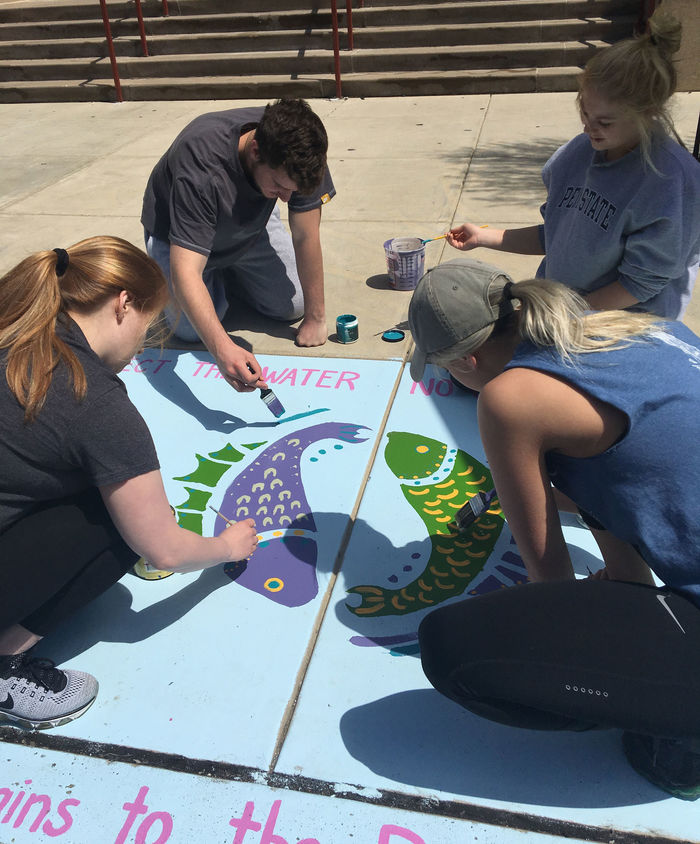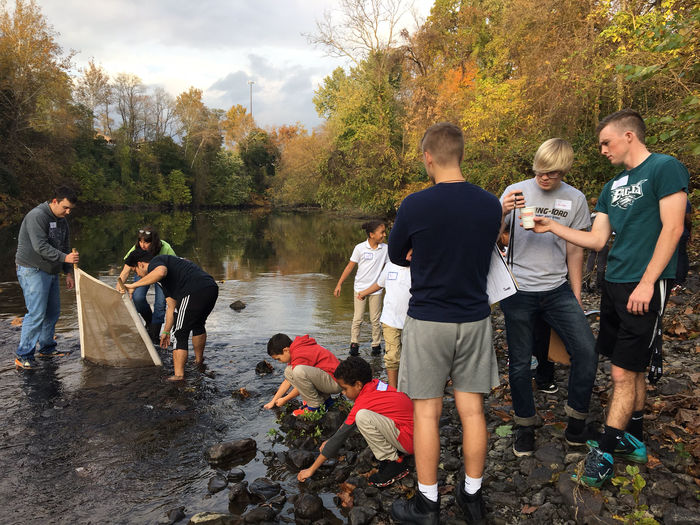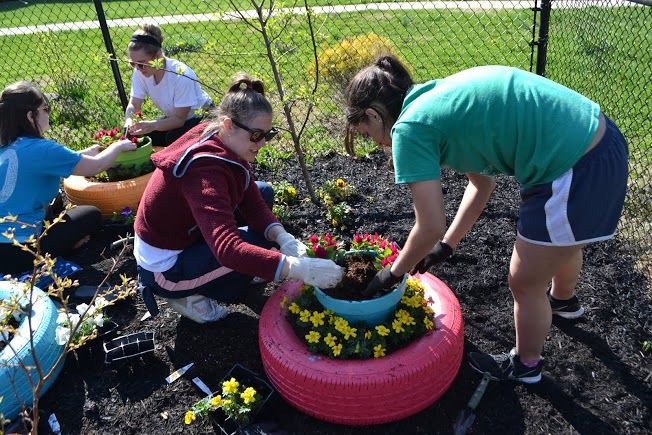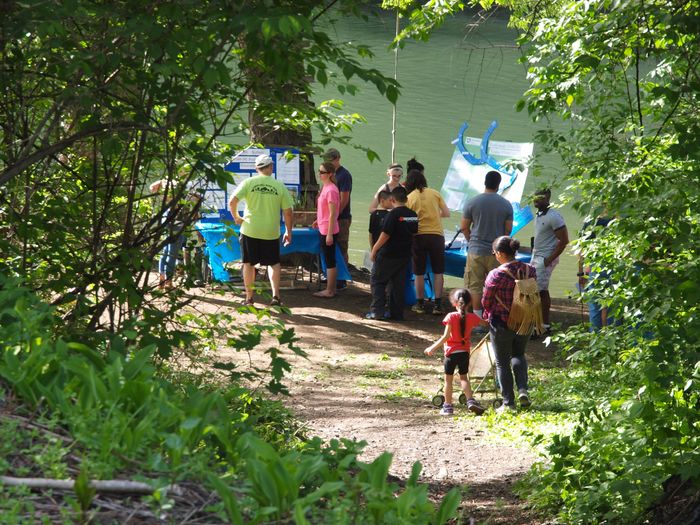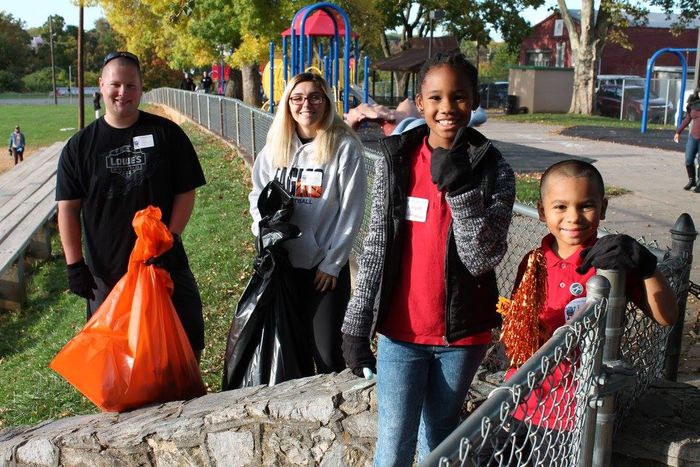Penn State students work each semester on environmental service learning and research projects to benefit the Berks County community and the students’ knowledge of environmental issues. Hands-on work combined with research helps students get to the heart of environmental issues.
Painting for River and Drinking Water Safety
Environmental Science, Introductory Painting
Students in Danielle D’Aries Introductory painting classes and Dr. Mahsa Kazempour’s Environmental Science classes teamed up with the City of Reading Public Works department to label fifty city storm drains in both Spanish and English to inform residents that what goes down the storm drains goes directly into the Schuylkill River. That means pollutants we dump and litter we drop harms river creatures and fish, which affects the food chain and all of our health. Four elementary schools were chosen for eye catching, kid-friendly murals created by the art class, and 44 other locations received a one-color stencil painted by environmental science students that says "No dumping, Drains to River". Students in painting classes sketched mural ideas, which were presented to City Public Works employees for use in their community education MS4 program, a stormwater management program for minimizing the impacts from runoff. After the city selected the drawings, D’Aries and her students created stencils for the murals. The environmental science students researched and made presentations about the effects of chemicals and litter going into storm drains on natural waterways along with stenciling forty-four storm drains around 5th and Penn Streets.
Explore the Schuylkill River to Investigate the Earth’s Spheres
Earth Science
Student’s in Dr. Jayné Park-Martinez’s Earth 002 (Earth Systems and Global Change) course teamed up with children from the Olivet Boys and Girls Club in Reading to understand the processes, interactions and evolution of the Earth’s spheres (geosphere, hydrosphere, atmosphere, biosphere, and anthroposphere). The Schuylkill River in northwest Reading was explored as a case study. Students and Olivet children tested the River’s water quality, and participated in a riverside clean-up. The Earth 002 students showcased their sphere knowledge and water quality findings using posters and interactive games to explain to the Olivet children the relationship between water tests and river health. The overall goals of the partnership were to foster the students’ and children’s love of nature, commitment to conservation, and enjoyment of age-appropriate scientific learning while the Penn State students improved their skills at communicating complicated science in easy to understand ways.
Environmental Awareness and Community Action Project
Environmental Science
The Environmental Awareness and Community Action Project is an ongoing service-learning project through which anywhere from 35 to 100 students per semester work in teams and partner with community organizations such as Nolde Environmental Education Center, Glenside School of Reading School District, Hawk Mountain, Kittatinny Sierra Club, Schuylkill River Heritage Area, and the Berks County Parks Department. Students research an environmental issue and, depending on the partner organization’s needs, take action through protecting the environment or educating the public. Dr. Mahsa Kazempour integrates this service learning into her BiSci 3 classes each semester.
Trail Rehabilitation Project
Sociology, Water Ecology, Social Science Writing, Communications, English, Spanish
The Center facilitated a community-wide effort to rehabilitate a half mile section of the Schuylkill River Trail in Northwest Reading into a usable trail and green space for Northwest Reading residents and all trail users. Communication across borders was central to bringing residents of the neighborhoods nearest to the trail into developing a community-driven vision for trail. Dr. Jayne’ Park-Martinez’s Water Ecology class sampled water along the beaches of the trail for the health of the Schuylkill River and shared the information they learned with the community members attending a Family Nature Festival. . Students in Dr. Donna Chambers’ Spanish classes gave tours of the festival and helped with translations.
With community input, students in Professor Catharine Catanach’s Communication class outlined a Community Outreach Plan for trail use, and two students in an independent study with Dr. Laurie Grobman interviewed community members, conducted other research, and wrote a Northwest Reading community report. Community partners and Penn State worked together on litter cleanups. Research and reports on related topics such as the economic benefit of urban trails, environmental justice and urban parks, and littering behavior were written by students in Social Science Writing and presented to the city’s Public Works director and other community partners.
Litter Reduction Pilot Program
Technical Writing, PR Media & Methods, Spanish, Social Science Writing, Science
Five classes at Penn State Berks partnered with the City of Reading and the Olivet Boys & Girls Club (BGC) of Reading to develop a “Litter Reduction Pilot Program in Baer Park.” The program aimed to educate children and their families about the harmful effects of littering and to implement litter-reduction strategies. The two primary events were a Park cleanup and a litter-reduction education event held at the Olivet BGC on Clinton Street, a few blocks from Baer Park.
Penn State students in Professor Tara Beecham’s English 202C wrote recommendation reports to the City of Reading for reducing park litter. Professor Catherine Catanach’s Comm 471 PR students wrote press releases, surveyed community members about littering, and worked with reporters at the two events. Students in Dr. Donna Chambers’ Spanish 3 learned vocabulary and did cultural reading on litter and used this knowledge to create bilingual dramatic story presentations for the children. Dr. Jayne’ Park-Martinez’s Science students reviewed and studied the impact on the environment and people of the collected litter. Dr. Laurie Grobman’s English 202A students did research projects about litter that were provided to community partners and presented learning stations, presentations, and fun activities to teach the children about litter.
